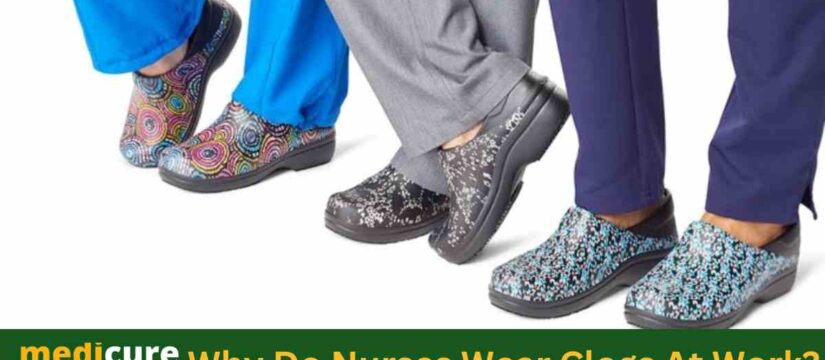MediCure

Why Do Nurses Wear Clogs At Work?
- July 15, 2023
- 0 Likes
- 0 Comments
Why Do Nurses Wear Clogs At Work? Nurses wear clogs at work due to the numerous benefits they offer. Clogs provide comfort, support, slip resistance, protection, and durability—all crucial factors in a demanding healthcare environment. With their versatile styles and long-term cost-effectiveness, clogs have become a popular choice among nurses worldwide. While personal preferences and workplace policies may influence individual decisions, clogs have proven to be a reliable and beneficial option for nurses seeking footwear that enhances their performance and well-being.
Thank you for reading this post, don't forget to subscribe!Why Do Nurses Wear Clogs At Work?
Nursing is a demanding profession that requires healthcare professionals to be on their feet for long hours, frequently in a fast- paced and changeable environment. In such a setting, having applicable footwear is crucial for the well- being and performance of nurses.
Why Do Nurses Wear Clogs At Work?
In this article, we will explore the reasons why nurses opt to wear clogs at work and the benefits they offer.
1. Comfort and Support
One of the primary reasons nurses opt for clogs is the exceptional comfort and support they provide. Designed with the demands of healthcare professionals in mind, clogs feature an ergonomic design that promotes a natural foot posture. The cushioning and shock immersion properties of clogs help reduce foot and leg fatigue, allowing nurses to stay on their feet for extended times without discomfort. Also, clogs frequently come with arch support, which is pivotal for individualities who may have to walk or stand for hours at a time.
2. Slip Resistance and Safety
Safety is paramount in healthcare settings, where spills and slippery floors can pose significant risks. Clogs are equipped with non-slip outsoles that provide excellent traction on various surfaces, including wet or oily floors. The slip-resistant nature of clogs significantly reduces the likelihood of accidents such as slips, trips, and falls, ensuring the safety of both nurses and patients.

3. Protection and Hygiene
Nurses work in environments where they are exposed to various hazards, including spills, sharps, and potential contaminants. Clogs, with their closed-toe design, offer an additional layer of protection against accidental spills and needlestick injuries. Furthermore, clogs are often made from materials that are easy to clean and sanitize, aiding in infection control efforts. The breathable construction of clogs also helps minimize foot odor, which is essential in a profession where long hours of activity can lead to sweat and discomfort.
4. Durability and Longevity
In the demanding healthcare environment, durability is a crucial factor when selecting footwear. Nurses require shoes that can withstand the rigors of their profession without wearing out quickly. Clogs are typically drafted from high- quality materials that are resistant to wear and tear. This continuity ensures that nurses can depend on their clogs to give comfort, support, and safety for an extended period.
5. Versatility and Style
Clogs come in a wide range of colors and designs, allowing nurses to choose options that match their personal style or uniform requirements. This versatility makes clogs suitable for various healthcare settings, from hospitals to clinics and long-term care facilities. Nurses appreciate the opportunity to express their individuality while maintaining a professional appearance.
6. Cost-effectiveness
While the initial cost of clogs may be higher compared to some other footwear options, they offer long-term cost savings. Due to their durability, clogs require less frequent replacement, reducing the overall expenses associated with footwear. Investing in high-quality clogs ultimately proves to be a cost-effective choice for nurses, considering the extended lifespan and performance they offer.
7. Anecdotal Evidence and Recommendations
Numerous nurses have shared positive experiences wearing clogs during their shifts. They have praised the comfort, support, and safety features of clogs, attesting to their suitability for the nursing profession. Many professional organizations and healthcare facilities also endorse clogs as an appropriate choice for nurses, recognizing the benefits they provide.
8. Controversies and Considerations
While clogs are widely favored by nurses, it is essential to acknowledge that personal preferences and workplace policies may influence footwear choices. Some individuals may find alternative options more comfortable or better suited to their needs. Additionally, certain healthcare facilities may have specific restrictions on footwear styles or requirements. It is crucial for nurses to be aware of such considerations and comply with their workplace regulations.
Also Read:
How to Pick Footwear for Healthcare Workers ?
The Top 10 Best Watches for Nurses
Top 05 Best Stethoscope for Nurses
FAQs Why Do Nurses Wear Shoes At Work?
- Are clogs the only suitable footwear option for nurses?
While clogs are highly popular, different nurses may have personal preferences for other footwear options such as athletic shoes or nursing sneakers. It’s important to choose footwear that offers comfort, support, and safety.
- Can clogs be worn in all healthcare settings?
Clogs are suitable for various healthcare settings, including hospitals, clinics, and long- term carefulness facilities. However, it’s essential to check with the specific workplace policies regarding footwear.
- Do clogs require any special care or maintenance?
Clogs are generally easy to clean and maintain. Utmost models can be wiped clean with a damp cloth or mild detergent. However, it’s advisable to refer to the manufacturer’s guidelines for care instructions.
- Are clogs only available in plain designs?
No, clogs come in a wide range of colors and designs. Many manufacturers offer options that allow nurses to express their personal style while adhering to professional standards.
- How do I choose the right size of clogs?
It’s crucial to refer to the manufacturer’s sizing chart and follow their guidelines for measuring your feet accurately. Choosing the correct size ensures optimal comfort and fit.